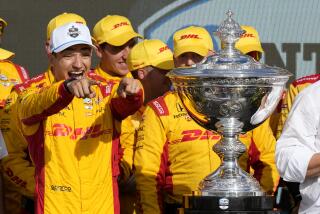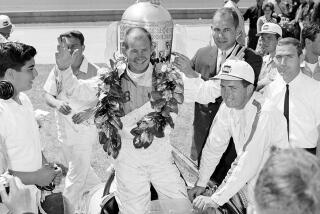A different sport
- Share via
Dale Earnhardt Sr. tended to like the status quo.
But since his death on the final lap of the 2001 Daytona 500, NASCAR’s series sponsor has gone from cigarettes to cellphones. Bill France Jr. gave way to his son Brian. Each year’s champion -- once determined by overall performance -- now emerges after a 10-race playoff system.
A rise in television ratings prompted a more heavy hand in the way NASCAR rules. A slip of the tongue on TV costs the offending racer thousands of dollars and championship points, but there are more well-funded teams than ever. There’s been a crackdown on cheaters and reckless drivers.
It was Earnhardt’s death that ignited NASCAR’s safety revolution, despite the tragedies of Kenny Irwin, Adam Petty and Tony Roper. Now, the Car of Tomorrow is the car of today. Racing ownership has been cross-pollinated by men who own a baseball team, a hockey team and an Academy Award. Today, there are guaranteed qualifiers, Kenny Wallace is a TV star, a Formula One driver started on the front row last week at Bristol and Dale Earnhardt Jr. is leaving the family business (to the distress of everyone with a No. 8 tattoo).
So what would the Intimidator, one of the greatest and most influential stars in stock car history, make of these and other changes?
Rusty Wallace, one of Earnhardt’s fiercest rivals and closest friends, doesn’t think his buddy would have liked today’s NASCAR, but he would have adjusted as he always did.
“Dale would not have liked how complicated everything is,” Wallace said. “He would have hated all the engineering, all the money it takes, all the employees, all the time at the racetrack, all the [additional] races. He just wanted it to be exciting and simple.
“Dale would have wondered why a two-car team needs 300 employees. When he was around, we were doing it with 70 people. He would wonder how everything blossomed out of control. Dale would want to know why crew guys, who used to travel in a van, will get mad and quit because they have to ride in a prop plane instead of a jet.”
Change, though, is inevitable. Only 19 drivers who started the fateful race that claimed Earnhardt’s life had full-time rides this season.
NASCAR and TV’s desire to attract the 18-to-34 demographic, and the size and scope of NASCAR, would have frustrated Earnhardt, a throwback to an earlier era.
But Earnhardt was also on the cutting edge of marketing and branding, the first driver to target the masses instead of just race fans.
“I’m not sure he would fit in today,” Kyle Petty said. Earnhardt “would speak his mind more than any driver out there today. The sport has turned more from a sport to a marketing tool. It’s only a sport for four hours on Sunday; the rest of the time it’s a business. . . . TV is laying the groundwork for how the sport is run now.”
Racers firmly believe that Earnhardt would not have let his race team, Dale Earnhardt Inc., fall behind competitively, with only three victories in the last three years. No doubt, it would be stronger than it is today, and Dale Earnhardt Jr. wouldn’t have announced he was leaving for Hendrick Motorsports.
“Senior definitely would have been on top of every little thing that needed to get changed to make DEI faster, and with DEI faster, Junior would be the one to benefit,” veteran driver Kenny Schrader said.
Certainly, NASCAR today offers more riches than ever. Kevin Harvick replaced Earnhardt at Richard Childress Racing and has career earnings of $39.3 million in less than seven full seasons. Earnhardt, rookie of the year in 1979, won $41.7 million in his career.
Earnhardt was 49 when he died in 2001. Based on their conversations with him, Wallace and Schrader agreed that 2003 probably would have been Earnhardt’s final season. Kevin Hamlin, Earnhardt’s last crew chief, isn’t so sure.
“He told me as long as he could keep racing and we had a chance to win, he was going to keep racing,” Hamlin recalled. “He wanted to win that eighth championship really bad. I asked him if he won his eighth if he would quit, and he just gave me that funny grin.”
If Earnhardt found it too difficult to walk away, he probably would have appreciated the current 10-race Chase for the Cup playoff system, because he was almost always in the top 10.
“The Car of Tomorrow, because it’s about the driver, would have been right in his wheelhouse,” said Andy Petree, a crew chief who guided Earnhardt to two of his seven championships. “The worse the car was to drive, the better he performed.”
Earnhardt wasn’t always the most safety-conscious, either, but NASCAR today is safer than ever, having jumped on the safety bandwagon “at light speed” after Earnhardt’s death, Petty said.
His greatest legacy may be the improved driver safety. NASCAR committed to protecting its drivers, and today there are soft walls at all tracks, padding around the head, fitted seats, monitored installation of seats and belts, kill switches in the steering wheel, a bigger roll cage, a roof hatch and onboard fire systems that come on automatically.
“The COT wouldn’t have saved his life,” Hamlin said. “He could have had a HANS device [head and neck restraint] and that wouldn’t have saved his life.
“Nothing could have saved his life except for what we’ve learned about seat belts.”
Wallace and Petree, now analysts for ESPN, said Earnhardt would fare all right in the current 24/7 mass media environment, even with NASCAR’s heavy-handed authority, because he calculated his words instead of popping off without thinking.
As for rough driving?
“He was so subtle about his style,” Petree said. “He didn’t wreck somebody so deliberately that NASCAR would have to act on it. It was always just borderline enough, there was never enough evidence.”
Petree is convinced that NASCAR would be different today if Earnhardt were still alive.
“A lot of the things wouldn’t be the way they are,” he said. “That’s how big this guy was.
“The sport’s great today, but it would be different.”
--
More to Read
Go beyond the scoreboard
Get the latest on L.A.'s teams in the daily Sports Report newsletter.
You may occasionally receive promotional content from the Los Angeles Times.










